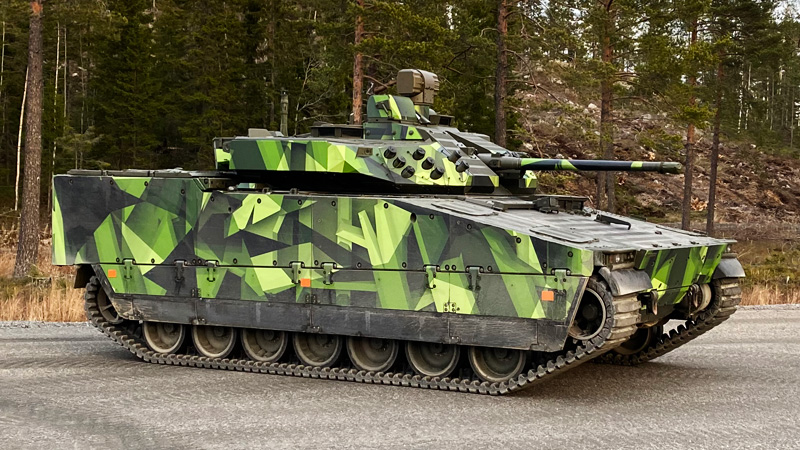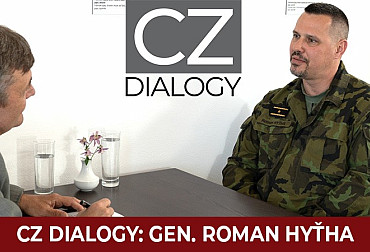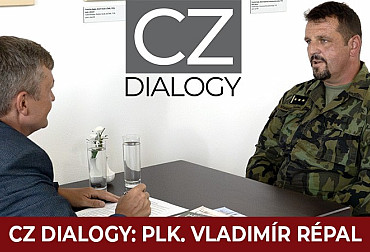Lubor Koudelka: We must be as transparent as possible
The Armaments and Acquisitions Section of the Ministry of Defence is one of the busiest parts of the Ministry, especially in recent years. The increased pressure to modernise the army's weapons and equipment, together with the approved defence spending of 2% of GDP, has resulted in an acceleration of the procurement process. The section is under great pressure not only from the Defence Committee of the House of Commons, but also from the media and the public, with the defence ministry having to constantly defend both the increased defence spending and the purchases themselves. Thus, for the next episode of our discussion programme CZ DIALOGY, we have invited Lubor Koudelka, Chief Director of the Armaments and Acquisitions Section of the Ministry of Defence.
Video: Interview with Lubor Koudelka, Senior Director of the Armaments and Acquisitions Section of the Ministry of Defence / CZ DEFENCE
Right at the beginning of the interview, Lubor Koudelka, who has worked in this section in various positions for eight years, praised all his colleagues who deal with procurement, because the number and variety of military contracts places extreme demands on this team. The basic rule, Koudelka said, is not only legislative instruments such as the Public Procurement Act, but other EU laws, regulations, directives and internal measures. However, transparency is the basis of any procurement. "We have to be as transparent as possible and this is the basis for all public procurement," Koudelka says. At the beginning of all contracts, even given their specific nature, there must be a political decision. "Of course, the very basic document or requirement is the specification of the Army to build a specific capability," the chief director adds, adding that the implementation of the contracts is the work of all the components of the Ministry of Defence, the General Staff and the control mechanisms that review all the steps that are taken during the implementation. Transparency is, after all, the starting parameter for further informing the public, according to Director Koudelka. "Of course, if a product comes out of the competition, we compete it for the best price. Of course, whoever gives the best offer is the one we will select," says Lubor Koudelka. He sees the fact that no one can communicate with the supplier as a disadvantage in these tenders. "It's not possible to modify the subject of the contract in any way, or it's not possible to negotiate with them, to change offers and so on," says Koudelka.
We wondered whether transparent tendering or government-to-government negotiations are better. "For more complex systems like the tracked IFV or the supersonic air force, if the army defines a particular product very precisely and has it justified so that I can go either by directly approaching the manufacturer or if a particular country allows it in a government-to-government way, then of course there is room for negotiation. In the case of government-to-government, it is not only about the acquisition of a specific system, but it creates room for broader cooperation between specific states," says Lubor Koudelka. According to him, however, the possibility of direct negotiations is narrowed by the ability of states to conduct such negotiations. "These countries include the United States of America, then it is Israel, to some extent it is Canada and Sweden," Koudelka says.
We asked whether open tenders are sometimes too open and could cause leaks of important information about the equipment or technology being procured. "I always try to find some balance between transparency, openness, informing the public, the media, informing especially the members of the defence committee, so that at the same time some sensitive information is not disclosed. Only in exceptional cases do we carry out public procurement in some kind of classified mode," Koudelka says, adding that it is important that members of the defence committee have enough information. "It is the control body that is in charge of this area. On the other hand, also given the current security situation, we do not want to inform about what we procure. Of course, the Public Procurement Act and the position of the contracting authority imposes certain obligations on us to publish information about contracts. But again, I openly admit that we use the exception for defence and security contracts," Koudelka says.
 Picture: In this episode of our discussion show CZ DIALOGY, we talked to Lubor Koudelka, Chief Director of the Armaments and Acquisitions Section of the Ministry of Defence of the Czech Republic | Michal Pivoňka / CZ DEFENCE
Picture: In this episode of our discussion show CZ DIALOGY, we talked to Lubor Koudelka, Chief Director of the Armaments and Acquisitions Section of the Ministry of Defence of the Czech Republic | Michal Pivoňka / CZ DEFENCE
In view of the recent signing of the contract for the acquisition of new CV90 tracked IFV, we asked Koudelka about the change in the original number of vehicles and the increase in the original price. "The original number was 210 infantry fighting vehicles in seven modifications and at the same time the option was incorporated. We actually started negotiations with the Swedish side in the final stages of negotiations, also taking into account the current security situation and the recommendation of the user who would activate the option within one year. We did not want to end up like in the case of the Pandurs, where we reduced the numbers to seven units to start with. And today we are buying them at relatively high prices, but they are realistic," explains Koudelka, who says that the decision to buy the CV90 as one package of 246 vehicles was finally made. Another advantage was the incorporation of this option into the contract, which Koudelka says helped to maintain or even reduce the price for some vehicle types. "The unit price of the IFVs is the same or in many cases lower, and at the same time we were able to put pressure on the Swedish side in terms of the delivery schedule. According to the original schedule, we were supposed to receive the first vehicles in 2027, and after quite a lot of pressure and argumentation that we were ordering a larger number, we achieved that we will receive the first vehicles in 2026," says Lubor Koudelka.
 Picture: In light of the recent signing of the contract for the acquisition of new CV90 tracked BVP, we asked Director Koudelka not only about the change in the original number of vehicles and the increase in the original price, but also about the unresolved servicing of the vehicles and the fact that the contract includes an inflation clause, which critics say could make the contract several billion crowns more expensive. | Michal Pivoňka / CZ DEFENCE
Picture: In light of the recent signing of the contract for the acquisition of new CV90 tracked BVP, we asked Director Koudelka not only about the change in the original number of vehicles and the increase in the original price, but also about the unresolved servicing of the vehicles and the fact that the contract includes an inflation clause, which critics say could make the contract several billion crowns more expensive. | Michal Pivoňka / CZ DEFENCE
Almost immediately after the signing of the contract for the new IFVs, criticism emerged regarding the unresolved servicing of the vehicles and the fact that the contract includes an inflation clause, which critics say could make the contract more expensive by several billion crowns. "I will say very frankly, we had an offer from the Swedish side valid until the 30th of June this year. If we had not signed the contract by the end of June, the price for the contract would have been much higher," explained the director of the armaments section, adding that at that point the price would have risen to 10 billion crowns. Therefore, time also played a role in the signing of the contract. "We want to have and will have negotiated a really good service contract. We want the service contract to be provided by a 100 per cent Czech entity on Czech territory and it would be very difficult, if not impossible, to conclude a mixed contract. This means that a third entity would still be involved. In the current contract, we have described in great detail what the parameters of the service will be. We want to have the contract signed by the time of delivery of the first vehicle, because the warranty service is provided for two years by BAE Systems Hägglunds," says Lubor Koudelka, adding that at the moment the legal basis and the award of the entire contract are being resolved, including whether it will ultimately be a state or private entity that will ultimately provide the service.
As far as the inflation clause is concerned, Lubor Koudelka says that it is a very common part of contracts in defence and security, but also in other areas. "We agreed to the inflation clause and we proposed it there mainly because we did not want the Swedish side to disproportionately take risks into account in the price, because we know where the current inflation is. If we hadn't agreed to the inflation clause, it would have had an incredible impact on the price," Koudelka explains. Therefore, the final price of the contract will also evolve and change based on real, audited indicators, based on labour, material and inflation prices in the individual countries where the components are manufactured. The infantry fighting vehicles are produced not only in the Czech Republic and Sweden, but also in Great Britain, the USA and Israel. "It's a very complex pattern that is over one page," clarifies the senior director of the armaments and acquisitions section of the Ministry of Defence.
Another highly discussed topic related to the acquisition of CV90 vehicles for the Czech Armed Forces is the share of the Czech defence industry in this contract, where we were interested in the actual amount and the level of involvement of Czech companies. "The basic parameter on which we were based was already set during the previous government and during the previous tender, where the 40% threshold was set as the minimum. It was based on an analysis we prepared at the Ministry of Defence, which sometime in 2018 stated that the real involvement of the Czech defence industry is somewhere between twenty-five and thirty-five percent," Koudelka argues. The requirement for a 40% share for Czech arms companies is therefore included in the contract. "It is binding on the Swedish side, and if this 40 per cent limit is not met, there are sanctions," Koudelka adds, according to whom another condition was that contracts with Czech companies be signed before the date of signing the contract, i.e. 24 May 2023.
The Armaments and Acquisitions Section of the Ministry of Defence is currently dealing with other major purchases. Whether it is Lockheed Martin's 5th generation F-35 aircraft or, most recently, the joint purchase of Leopard 2A8 tanks with the Federal Republic of Germany. The acquisition of air defence assets will also be discussed within the framework of the expected changes to the Army Construction Concept.
The selection of new Light Strike Vehicles for the 43rd Airborne Regiment is also of considerable interest, and we were interested to see where the selection process currently stands. "This is a live contract. It's generally conducted as an open tender. It is a competitive process. We have received some bids from potential suppliers and we are now evaluating those bids," says Lubor Koudelka, senior director of the armaments and acquisitions section of the MoD.
If you are interested in how many contracts the Armaments Section handles annually, whether the signed contracts for H-1 helicopters, Caesar guns or the MADR system are progressing according to the delivery schedule, etc., listen to the full interview with Lubor Koudelka at the beginning of this article.





















